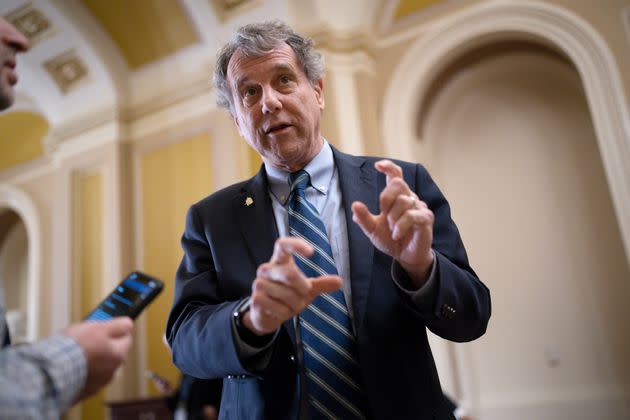Democrats in battleground Senate races across the country virtually all raised more than their Republican opponents in the first quarter of this year.
The fundraising edge spanned the country and across different kinds of candidates. Democratic incumbents in Nevada, Ohio, Montana, Pennsylvania and Wisconsin; candidates in open races in Michigan, Maryland and Arizona; and challengers running against GOP incumbents in Texas and Florida all brought in more money than their Republican counterparts.
“Battle tested Senate Democrats’ strong fundraising is a testament to the support they have earned from voters and grassroots supporters,” Tommy Garcia, a spokesperson for the Democratic Senatorial Campaign Committee, said in a statement. “While each day brings new revelations about Republican Senate candidates’ lies, baggage and disqualifying flaws, Senate Democrats are building winning campaigns and communicating with voters about how they are fighting for the priorities of hard working Americans.”

Of course, Democrats are set to have a hard time holding on to their narrow majority in the U.S. Senate regardless of their fundraising hauls. The party can afford to lose only one seat, and the map this cycle is unforgiving for them. Sen. Joe Manchin’s retirement has effectively signed his deep-red state of West Virginia away to the GOP. And Sherrod Brown in Ohio and Jon Tester in Montana are running for reelection in states that former President Donald Trump won in 2020, and Trump will again be on the ballot this fall.
What’s more, Republicans have prioritized self-funding candidates, who are capable of ratcheting up spending on a moment’s notice. And Republican finance billionaire Ken Griffin has seeded a $10 million super PAC in support of Former Gov. Larry Hogan’s bid in Maryland.
The National Republican Senatorial Committee, Senate Republicans’ campaign arm, declined to comment for this story.”
Here is a breakdown of the numbers in the 10 states:
Ohio: Sen. Sherrod Brown (D) raised $6.4 million in March alone, giving him $16 million in cash on hand (the term for funds left over after expenses). Republican businessman Bernie Moreno, who won his contentious primary in March, raised $1.1 million over the same period, including $300,000 he lent the campaign, bringing his cash total to $1.8 million.
Nevada: Sen. Jacky Rosen (D) raised $5 million in in the first quarter, leaving her with $13.2 million in cash on hand. Her leading Republican challenger, former Army Capt. Sam Brown, raised $2.4 million, with $2.3 million in cash on hand.
Montana: Sen. Jon Tester (D) raised $8 million in Q1, leaving him with $12.6 million in cash on hand. Republican Tim Sheehy, an aerospace entrepreneur and former Navy SEAL, raised $3 million, with $1.9 million left in cash on hand.
Pennsylvania: Sen. Bob Casey (D) raised $5.7 million in Q1, bringing his war chest to $11.9 million. Casey’s Republican challenger, former hedge fund manager Dave McCormick, raised $5.4 million, of which $1 million was self-funded. McCormick, who is capable of self-funding, had $6.2 million in cash on hand as of the end of March.
Wisconsin: Sen. Tammy Baldwin (D) raised $5.4 million in Q1, bringing her cash on hand to $10.2 million. Republican challenger Eric Hovde, a real estate developer, raised $9 million, of which $8 million was self-funded. He had $5.3 million in cash on hand.
Arizona: Independent Sen. Kyrsten Sinema’s retirement has created an open race between Democratic Rep. Ruben Gallego, and Republican Kari Lake, a former TV newscaster and gubernatorial candidate. Gallego raised $7.5 million in the first quarter of 2024, bringing his cash-on-hand total to $9.6 million. Lake raised $3.6 million over that period and had $2.5 million in cash at the end of March.
Michigan: Democratic Sen. Debbie Stabenow’s retirement has created an open race in which Rep. Elissa Slotkin is the leading Democratic contender and former Rep. Mike Rogers is the top Republican candidate. Slotkin raised $4.4 million in the first quarter of the year, bringing her cash-on-hand total to $8.6 million. Rogers raised $1 million over that period and had $1.4 million in cash on hand.
Maryland: The race to succeed retiring Sen. Ben Cardin (D) in a solid Democratic state would not ordinarily be competitive. It is still a very unlikely pickup for Republicans, but the entrance of former Gov. Larry Hogan into the field could at least force Democrats to spend serious money. Hogan raised a respectable $1.9 million in less than two months of running, leaving him with $1.5 million in cash on hand. With an extra month, Hogan’s two main Democratic rivals outdid him in the first quarter of the year. Angela Alsobrooks, the executive of Prince George’s County, raised $2.1 million and had $3.2 million in cash on hand. And Rep. David Trone (D), a multimillionaire liquor retailer, raised $18.7 million, of which only $200,000 was not self-funded. He had less than $1 million left over at the end of March.
Texas: Democratic Rep. Colin Allred’s campaign against Sen. Ted Cruz (R) is widely seen as a long shot. But he will have at least some cash to get his message out. Allred raised $6.5 million from mid-February to the end of March, compared with Cruz’s $4.6 million. And while Cruz has $9.3 million in cash on hand, Allred has $10.5 million.
Florida: Former Democratic Rep. Debbie Mucarsel-Powell’s run against Sen. Rick Scott (R) is likewise a very tough battle. She did have a better fundraising quarter than Scott, however, having raised $3.5 million to Scott’s $2.2 million. Scott has a cash-on-hand edge, though, with $3.8 million to Mucarsel-Powell’s $2.8 million. But Scott, a wealthy hospital founder, is capable of self-funding if the race gets tighter.
